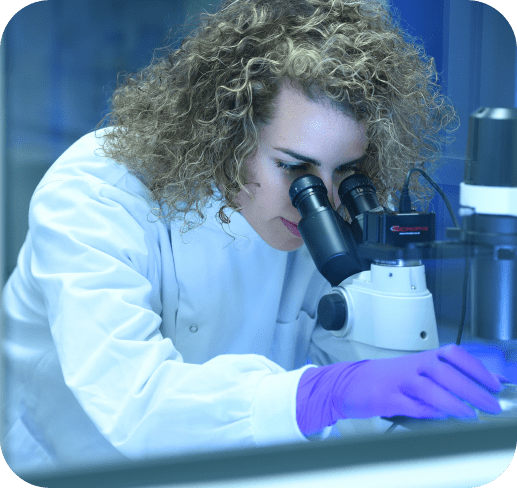Gene Editing
Delivering phenotypically relevant disease models
Industry leader in producing reliable in-vitro liver and metabolic disease models
Bespoke CRISPR disease modeling
DefiniGEN’s induced pluripotent stem cell (iPSC) OptiDIFF platform enables the generation of high-quality wild-type and disease cell models.
We can produce mature cells which recapitulate a range of disease phenotypes and are being adopted for preclinical evaluation studies. We have developed various disease models for a wide range of metabolic indications.
DefiniGEN offer the ability to develop custom models for screening or characterizing lead compounds for indications that have previously been difficult to study.
RAPID TURNAROUND TIME
Our optimized protocols and standardized workflows ensure fast, efficient project completion.
HIGH SUCCESS RATES
Our deep expertise handling challenging iPSCs easily translates into successful CRISPR editing of iPSCs.
COLLABORATIVE PROJECT MANAGEMENT
We conduct every project with complete transparency and in close collaboration with client teams to ensure we deliver what you need.

Disease Modeling expertise
When you can't find the right iPSC line or iPSC donor material to create a cell-based model for a specific disease, DefiniGEN can help.
With our years of experience generating mature, primary-like cells from iPSCs and our proficiency at using CRISPR for targeted genome editing, we can build the cells that best reflect the biology you wish to model.
Study disease-causing mutations
We can introduce point mutations/SNPs or correct disease-causing mutations.
Inactivate genes to study their function
We can inactivate your target gene by inserting a disruptive indel or by deleting a large section (few bp to > 1kb) of the target gene. We can also apply these methods to knock out multiple genes in the same reaction.
We've transformed the "difficult" into the "routine" and have successfully differentiated multiple iPSC lines into a range of target cell types that fully recapitulate the mature cell phenotype.
We can use CRISPR gene editing to generate cell models that:
- Repair causative mutations in a patient-derived line
- Introduce causative alleles into a healthy parental line
- Are isogenic with existing healthy or disease-state cells
Want to do the differentiation yourself? We can perform the CRISPR genome editing and send you the bespoke iPSCs
Disease modeling workflow
Our custom cell model service is an integrated, end-to-end package that includes iPSC line or donor selection, the complete CRISPR editing workflow, and differentiation into the target cell type. From basic frameshift knock-out mutations to complex knock-in genetic changes, our dedicated scientific team will work collaboratively with you to design and build the most relevant cell-based model for your project.
Our workflow consists of footprint-free CRISPR/Cas9-mediated editing, single-cell cloning of the edited population, and characterization of expanded clonal cell lines to identify positive clones. The edited iPSC cells maintain pluripotency and have normal, stable karyotypes, which are important for testing downstream applications such as directed differentiation.
iPSC reprogramming
We can start your service with any of our comprehensively characterized in-house iPSC lines, you can supply your own iPSC lines, or you can provide material derived from patient donors.
Gene Editing
We work in collaboration with you to design sgRNAs and use a footprint-free CRISPR/Cas9 system to edit the iPSCs. We optimize transfection conditions before full-scale editing, and then screen the edited populations, seed single cells, and sanger sequence the clones. You select which clones to move forward with or you can provide material derived from patient donors.
iPSC Differentiation
We use our world-leading OptiDIFF platform to differentiate your edited iPSCs. We've transformed the "difficult" into the "routine" and have successfully differentiated multiple iPSC lines into a range of target cell types that fully recapitulate the mature cell phenotype.
*Using our in-house iPSCs can increase your chances of success as we already have a deep understanding of how these iPSCs will respond to CRISPR editing and during differentiation.
Case Studies
We can give your project a big head start with our well-characterized in-house iPSCs that model a number of monogenic diseases, many with multiple different models.
When modeling any pathology using an iPSC differentiation platform, it is vital to confirm that the metabolic pathways implicated are expressed and active in the wild-type cells. DefiniGEN's hepatocytes are mature, predictive, and display all relevant biological pathways pertinent for our disease models.
Frequently asked questions
How long is the turnaround time for a CRISPR project?
It depends on the complexity of the project but generally we deliver the edited cell line in 8 weeks. If differentiation into a specific cell type is required, additional time will be necessary and will depend on the requested scale and cell type of interest.
How long does the entire gene editing process take?
The entire gene editing process takes between 8-10 weeks depending on the complexity of the project. We will advise you of the lead time when we generate your quote.
What do you provide as a technical support package?
We work as a research partner offering collaborative services. We offer bi-weekly calls with our clients and interim emails with project reports. Our team is always available to provide technical support which can include experimental design and training on best practices for handling cells. Contact us today >

Let’s work together.
Contact us to arrange a free consultation to discuss your project requirements today.

